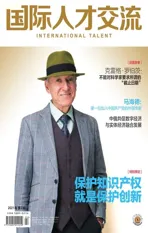Hangzhou Forms Talent Club to Further Push Internationalization of the Region
2021-03-02ByLiHuiruPhotobyJinZhaoxing
By Li Huiru Photo by Jin Zhaoxing
The Hangzhou International Alliance and the International Talent Club formed on Nov. 2020 to attract more talents and further push the internationalization of Hangzhou.

Tomokazu Sato, general manager of Toshiba Logistics(Hangzhou) Co., Ltd.
While science and technology are considered primary productive forces, talents are the most critical factor in technological innovation. In order to attract more international talents, improve their satisfaction and level of happiness in Hangzhou, and build the city’s soft power, the city formed the Hangzhou International Alliance and the International Talent Club on Nov. 11, 2020.
The alliance and the club were introduced by the Hangzhou Municipal Science and Technology Bureau and overseen by the Bureau of Economic Development and Science and Technology of Hangzhou Qiantang New District.
According to Zhu Chongmin, deputy director of the Hangzhou Municipal Science and Technology Bureau, the Hangzhou International Friendship Alliance is committed to handling relevant tasks such as processing work permits for foreigners to come to China, while the Hangzhou International Talent Club will regularly organize activities to enhance the services for international talents and help integrate them better into the city.
During the inauguration ceremony, Tomokazu Sato,general manager of Toshiba Logistics (Hangzhou)Co., Ltd. shared his impressions of Hangzhou, stating that he first came to the city in the early 2000s and it has been rapidly developing ever since.
“My first encounter with Hangzhou was in 2002,and I was deeply impressed by the beautiful scenery around the West Lake. After 17 years, Hangzhou has changed a lot. All of the high rises and fast vehicles make it a hustling city, and although it may be less a leisurely city when compared with 2002, it is now showcasing dynamic economic development and a rapid pace of reform,” said Sato.
He also explained how numerous international economic activities such as eWTP, initiated by Hangzhou and in accordance with policies like the Belt and Road Initiative’s, are conducive to transnational development.
Sato believes Hangzhou will demonstrate even greater development in the future, as digital technologies continue to be widely applied around the city.
Hangzhou’s Qiantang New District was established in April 2019 to introduce and develop a strong workforce, and create a high-quality environment suitable for the development of all kinds of talent, especially foreign talents. The birth of the new district is rooted in Zhejiang’s strategy to economically integrate the Yangtze River Delta and Greater Bay Area.It is also part of Hangzhou’s “Development around the Qiantangjiang River Strategy”.
With the stable development of foreign capital and Sino-foreign joint ventures in the region, and the additional support of 14 local universities, more and more foreign talents are likely to work and live in the new district.
At present, more than 5,000 foreign residents live in the new district, 454 foreign talents who have applied for foreigner’s work permits, and more than 10 non-Chinese foreign talents who have been selected for talent programs at all levels.
As the Chinese saying goes, it takes 10 years to grow a tree but 100 to rear people. Cultivating and retaining talents requires continuous investment and policy design.
So as to meet the needs of all kinds of talents, especially foreign talents, the Qiantang New District has promoted “One Trip Only” reforms, integrating services for talents living and working in Qiantang.This includes enabling two administrative service centers in the new district to provide convenient services such as processing work permits.

Quality inspector worked in laboratory
Since it’s established in 2019, the service centers have processed 511 requests and set up an additional“overseas personnel service station” in the Langqin community where many foreign talents live. The station can handle 59 types of foreign talent-related matters pertaining to immigration, social security,and community-level overseas Chinese affairs. Convenient and accessible services for international talents mean that the city can effectively improve work efficiency and talent satisfaction.
